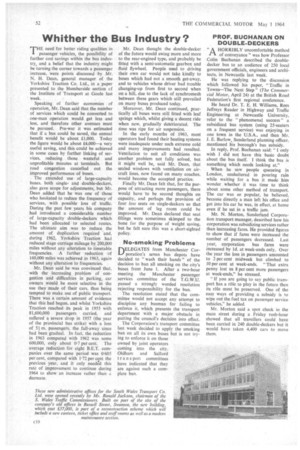PROF. BUCHANAN ON DOUBLE-DECKERS "A HORRIBLY uncomfortable method of conveyance"
Page 54

If you've noticed an error in this article please click here to report it so we can fix it.
was how Professor Colin Buchanan described the doubledecker bus to an audience of 250 local government officials, engineers and architects, in Newcastle last week.
He was replying tcr the discussion which followed his paper, "Traffic in Towns—The Next Step" (The Commercial Motor, April 24) at the British Road Federation's first regional conference.
He heard Dr. T. E. H. Williams, Rees Jeffreys Reader in Highway and Traffic Engineering at Newcastle University, refer to the "phenomenal success" a subsidized bus system (using 25-seaters on a frequent service) was enjoying in one town in the U.S.A., and then Mr. J. E. Barlow, Sunderland planning officer, mentioned his borough's bus subsidy.
In reply, Prof. Buchanan said: "I only wish I did not have this basic doubt about the bus itself. I think the bus is something which needs looking at"
When he saw people queueing in London, unsheltered in pouring rain while waiting for a bus it made him wonder whether it was time to think about some other method of transport. The car was so popular, he believed, because directly a man left his office and got into his car he was, in effect, at home even if he sat in a traffic jam.
Mr. N. Morton. Sunderland Corporation transport manager, described how his corporation was subsidizing services rather than increasing fares. He provided figures to show that if fares were increased the number of passengers decreased. Last year, corporation bus fares were increased by id. at week-ends only. Over the year the loss in passengers amounted to 2 per cent midweek but climbed to 10 per cent at week-ends. "That extra penny lost us 8 per cent more passengers at week-ends," he stressed.
" If you are going to say public transport has a role to play in the future then its role must be preserved. One of the easy ways of providing a subsidy is to wipe out the fuel tax on passenger service vehicles," he added.
Mr. Morton said a spot check in the main street during a Friday rush-hour showed that all travellers could have been carried in 240 double-deckers but it would have taken 4,400 cars to move them.




















































































































































































































































